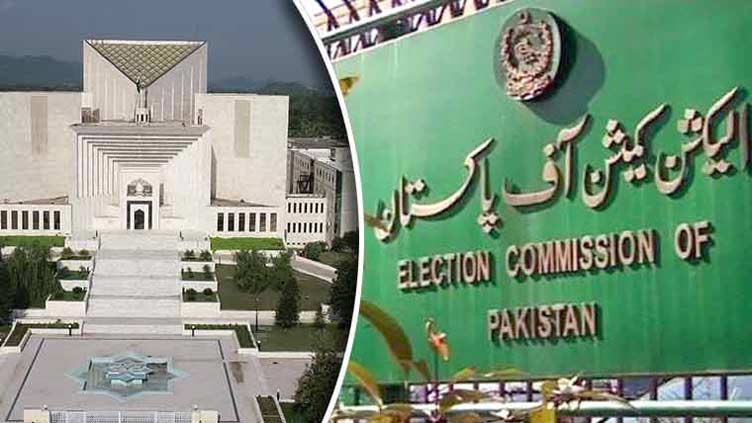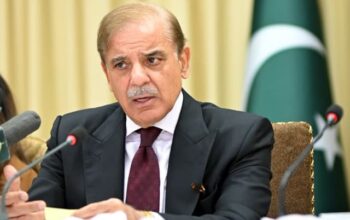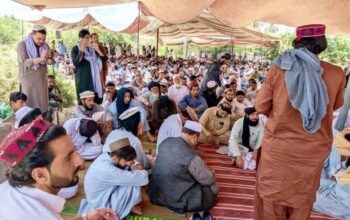By Staff Reporter
ISLAMABAD: The Election Commission of Pakistan holds crisis talks with legal experts on Tuesday, facing potential contempt of court over its delayed implementation of a Supreme Court order to allocate reserved parliamentary seats to former Prime Minister Imran Khan’s Pakistan Tehreek-e-Insaf (PTI) party, issued over two months ago.
The commission’s move follows the Supreme Court’s warning of consequences if its July 12 order and September 14 clarification are not implemented. A detailed order issued on Monday also sought immediate implementation of eight judges’ majority judgment on reserved seats.
The issue began when the Election Commission denied PTI-backed independent lawmakers reserved seats in assemblies, a decision upheld by the Peshawar High Court.
PTI-backed candidates, who ran as independents after losing their party symbol in Feb 8 polls, joined the Sunni Ittehad Council to claim reserved seats, as independents are ineligible.
Parliament also passed the Elections (Second Amendment) Bill, 2024, restricting PTI’s access to reserved seats. The bill deems candidates who fail to declare party affiliation before seeking an election symbol as independents.
The Supreme Court, however, ruled that the Election Commission’s decision to deny recognition to PTI as a major political party infringed upon the electorate’s rights.
“…unlawfully denying recognition of a major political party and treating its nominated candidates as independents…significantly infringe upon the rights of the electorate and corrode their own institutional legitimacy,” the court said.
But, the election body views PTI’s organizational structure and a newly introduced contentious election law, aimed at circumventing the Supreme Court verdict on reserved seats, as obstacles to implementing the top court order.
The recently passed amendment to the Elections Act has further complicated the situation. The law, approved by both houses of parliament last month, stipulates that parties failing to meet the deadline will not be allocated reserved seats. Additionally, candidates without prior declaration of party affiliation will be considered independent lawmakers.
The amendments include provisions appearing to override Supreme Court orders.
National Assembly Speaker Sardar Ayaz Sadiq also backed the ECP’s defiance, urging election authorities to disregard the Supreme Court’s ruling.
Speaker Sadiq stated that the Supreme Court’s judgment on reserved seats “cannot be implemented under the Amended Election Act, 2017.”
“As the judgment of the SC was rendered based on the law prior to the enactment of the amendment, the said judgment is now incapable of implementation,” Sadiq wrote in a letter to the ECP.
The letter noted that, in the context of the Amended Election Act, which was passed after the Supreme Court verdict, the ruling on reserved seats cannot be implemented under the new law. “Instead, it is the Amended Election Act that shall prevail and supersede the prior ruling.”
The top court’s detailed, 70-page, judgement, issued on Monday, ruled that the election commission’s decision to deny recognition to a major political party infringed upon the electorate’s rights.
“When election authorities engaged in actions, such as unlawfully denying the recognition of a major political party and treating its nominated candidates as independents, they not only compromise the rights of these candidates but also significantly infringe upon the rights of the electorate and corrode their own institutional legitimacy,” the detailed verdict read.
The court ruled that the constitution and the law did not prevent any political party from fielding candidates, referring to the ECP’s decision to strip the PTI of its election symbol of a ‘cricket bat’ over irregularities in intraparty elections.
“The ECP’s March 1 decision is contradictory to the constitution and has no legal value,” the court ruled, with regard to the election body’s denial of reserved seats to the Sunni Ittehad Council (SIC) and its decision to instead give them to other political parties on the principle of proportional representation.
But, Law Minister Azam Nazeer Tarar insisted that independent candidates joining political parties is “irreversible” and questioned the court’s decision, citing the PTI’s absence as a petitioner in the case.
“The detailed judgment fails to clarify how reserved seats will be allocated under current regulations,” Tarar told a press conference.
The top court has sparked debate on its authority after invoking Article 187 to ensure “complete justice” in the case of reserved seat, a move critics say oversteps constitutional limits.
“The exercise of appellate jurisdiction with suo moto powers is a novel precedent based on popular will of the people,” Pakistan Bar Council Vice Chairman Farooq H. Naek told Dawn newspaper.
Naek argued the decision “rewrote the Constitution” by overriding Article 4, which ensures individuals’ rights. “This judgment has been passed under Article 187, but unfortunately, it has not been passed in accordance with the doctrine of complete justice.”
Legal experts are divided. Raja Inam Ameen Minhas said the ruling set a new precedent by extending relief to a party with a pending impleadment application. “If the bench intended to go beyond jurisdiction, it should have put the parties concerned on notice.”
Raja Khalid Mehmood Khan called the decision “populist,” citing the court’s authority under Article 185.
Conversely, Advocate Mohammad Akram Sheikh supported the court’s use of Article 187. “While exercising Article 185, the Supreme Court is not denuded from its powers vested in Article 184 or 187.”
Copyright © 2021 Independent Pakistan | All rights reserved




